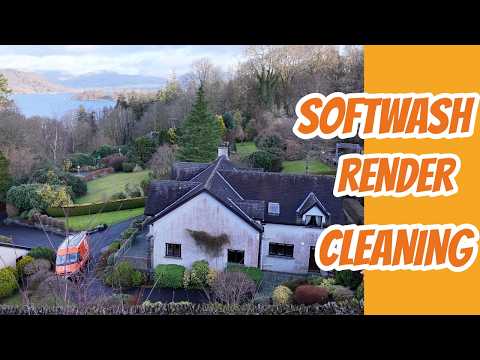
Follow me as we embark on transforming this beautiful property overlooking Windermere in the Lake District by Softwashing and steam cleaning.
Softwashing is a low-pressure cleaning method used to clean and sanitize exterior surfaces.
The term “softwashing” refers to the use of a gentle, non-abrasive cleaning solution and a low-pressure spray to remove dirt, grime, and other contaminants from surfaces.
The chemical solution is applied to the surface being cleaned using a low-pressure spray, which is typically between 60 and 100 psi. The solution is allowed to sit for a period of time to allow it to penetrate and dissolve the contaminants on the surface.
After the chemical solution has had time to work, it is rinsed away using a low-pressure hot water spray. Softwashing is an effective method for cleaning and sanitizing surfaces without causing damage, as the low-pressure spray is gentle enough to avoid damaging delicate surfaces.
One of the main advantages of a soft wash or as it’s known softwashing is that it is applied at low pressure, which ensures that even delicate surfaces aren’t damaged. This makes it the perfect cleaning method for those who want to maintain the look of their property without causing any harm to surface.
It’s different to Pressure Washing or Jetwashing in that it utilises low pressure to apply chemicals and rinse with hot water.
Softwashing kills the living spores of algae, mould, bacteria and organic biofilm that cold water pressure washing cannot remove.
Painting over the living biofilm of algae and mould will result in it striking through the paint after a short period of time.
Windermere is the largest natural lake in England and is located in the heart of the Lake District National Park.
Windermere is about 10.5 miles (17 kilometers) long and 1 mile (1.5 kilometers) wide. It has a maximum depth of around 220 feet (67 meters), making it one of the deepest lakes in England.
Leave a Reply